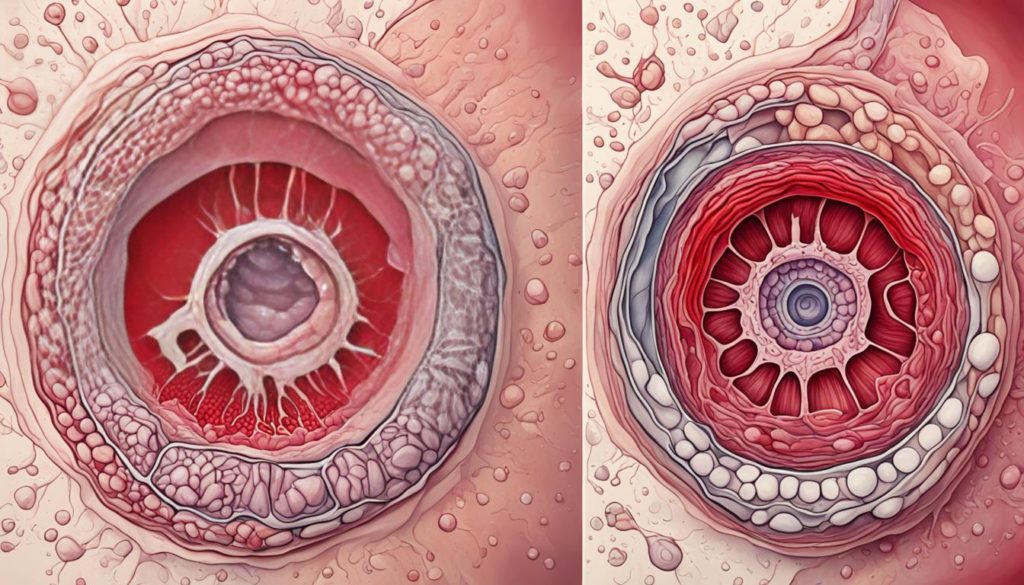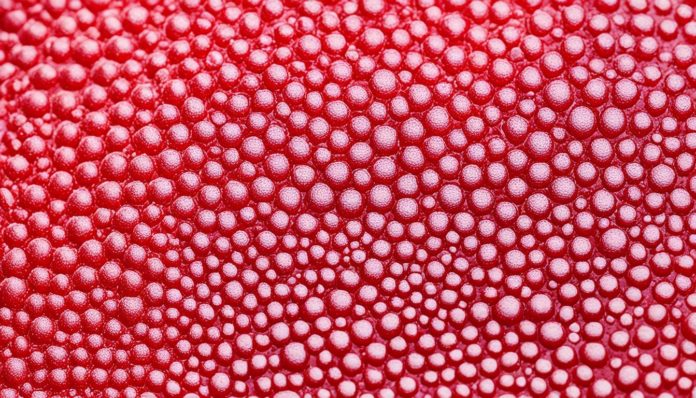Did you know almost half of skin infections like boils come from a bacterium called Staphylococcus aureus? These boils are not just annoying. They can turn into serious problems without the right treatment. We cover everything about boils here, from why they happen to how to treat them.
Key Takeaways
- Boils are a prevalent type of skin infection.
- Staphylococcus aureus is commonly responsible for causing boils.
- Recognizing symptoms early can prevent severe abscesses.
- Treatment options include medications, surgical intervention, and home remedies.
- Proper hygiene can significantly reduce the risk of boils.
- Consult a healthcare professional for persistent or recurring boils.
What Are Boils?
Boils, also known as skin abscesses, are more intense than regular pimples. They look like red, swollen lumps. They’re caused by the Staphylococcus aureus bacteria. This leads to staph infections when bacteria enter through skin cuts, making our immune system react.
Boils can pop up anywhere, but they love the face, neck, armpits, shoulders, and buttocks the most. The main causes of boils are bacteria, clogged sweat glands, and hair growing the wrong way. Unlike cystic acne, boils are filled with pus.
Knowing how to spot and treat boils is key. It stops staph infections from spreading or getting worse. Mixing up boils with something else can lead to wrong treatments. So, getting it right and seeking medical help quickly is really important.

Understanding the Causes of Boils
Boils are painful, swollen bumps full of pus. They occur due to reasons that harm skin health. Knowing why boils happen is key to stop and treat them. Let’s look at what mainly causes boils.
Bacterial Infections
Most boils come from staph infections. Staphylococcal bacteria live on our skin or in our noses. They can get into hair follicles or oil glands, causing boils. Not taking good care of your skin can raise the chance of infection.

Weakened Immune System
People with weak immune systems are more likely to get boils. If your immune system is down, due to sickness or bad health, bacteria easily attack your skin. Keeping your immune system strong with good food, exercise, and skin care is vital.
Poor Hygiene
Bad hygiene is a big reason for boils. Not cleaning your skin well, using dirty towels, or wearing dirty clothes can attract bacteria. Cleaning your skin well and using antibacterial soap can lower boil risks and fight staph infections.
Common Symptoms of Boils
It’s important to recognize the early signs of boils for quick treatment and pain relief. Boils start small but can worsen quickly without proper care. Here are the key stages and symptoms to watch for.
Initial Redness
Boils begin with skin redness. This happens as the body fights the infection causing inflammation. You’ll see a tender, red spot that feels warm.
Swelling and Pain
The red spot gets bigger and swells as the infection grows. This causes a lot of discomfort and pain. Managing pain early can help avoid worse problems.
Pus Formation
Then, the boil fills with pus, making it a pus-filled bump. This stage hurts because of the pressure from the pus. Watching these bumps and getting medical help if they change is key.
How Boils Are Diagnosed
Healthcare professionals start by looking at the boil closely. They check its size, redness, and if there’s pus. These signs help them know it’s a skin infection.
They also ask about the patient’s health history. This includes questions on skin injuries, hygiene habits, and immune health. It helps figure out what caused the boil.
Sometimes, tests on the skin infection are needed. This means getting a pus sample from the boil. The sample goes to a lab. There, it’s tested to find out the exact bacteria causing the infection.
Here’s a summary flow of the diagnostic process:
- Visual Examination: Inspecting the boil for size, redness, and pus.
- Patient History: Collecting information on potential contributing factors.
- Laboratory Tests: Conducting skin infection tests to pinpoint bacterial causes.
By using these steps, healthcare workers can make sure they know what’s causing the boil. This leads to better ways to treat it.
Effective Treatment Options for Boils
Finding the right treatment for boils can make recovery faster and less painful. Treatments vary based on the boil’s severity, from medicines to surgery and natural remedies. Let’s look into these options.
Medications
Doctors often use antibiotics for boils for those caused by bacteria. These antibiotics kill the bacteria, helping heal quicker and stop infection spread. Common antibiotics include dicloxacillin and cephalexin.
Surgical Intervention
If a boil doesn’t get better with medication, surgical drainage may be needed. This process cuts and drains the boil to reduce pain and pressure immediately. A healthcare professional should do this to avoid more problems.
Home Remedies for Boils
Natural methods can also ease boil discomfort. Home remedies for boils include warm compresses to draw out the boil. Also, antibacterial herbs like turmeric and tea tree oil can lessen inflammation and fight infection.
| Treatment Option | Description | Effectiveness |
|---|---|---|
| Antibiotics for Boils | Medications that target bacterial infections causing boils. | High |
| Surgical Drainage | Procedure to drain pus from a severe boil. | Very High |
| Home Remedies | Natural methods such as warm compresses and antibacterial herbs. | Moderate |
Preventing Boils
Preventing boils starts with a strong skin care routine and boosting immune health. Keeping clean is key to lower the chances of getting bacterial infections that lead to boils.
- Hygiene: Wash your skin often with warm water and gentle soap. Pay extra attention to sweaty or rubbed areas.
- Moisturizing: Moisturize to stop your skin from drying and cracking. These can be ways for bacteria to get in.
- Clothing: Choose loose and comfy clothes from natural materials like cotton. This helps your skin breathe and reduces irritation.
- Diet: Eat a diet full of vitamins and minerals to keep your immune health and skin strong.
- Exercise: Staying active boosts your immune system and helps blood flow. This is good for stopping boils.
- Manage Stress: Too much stress can hurt your immune system. This makes it easier to get infections, including boils.
To reduce the chance of getting boils, make these steps part of your daily life. Personal cleanliness and good health habits are crucial. They help a lot in the prevention of boils and keeping your immune health strong.
When to See a Doctor for Boils
Knowing when to seek treatment for boils is key. While you can often care for boils at home, sometimes you need a doctor’s help.
Persistent or Recurring Boils
If your boils keep coming back, it’s important to see a healthcare provider. If they don’t heal within two weeks, it might mean you have staph bacteria. Getting medical help is important for diagnosing and treating any deeper issues.
Fever Accompanying Boils
If you get a fever with your boils, you should see a doctor right away. A fever might mean the infection is getting worse. This shouldn’t be ignored because it could lead to more serious problems like cellulitis or sepsis.
Boils Spread to Other Parts
Boils that spread or cluster need a doctor’s care. This may show a serious infection. Getting timely treatment is crucial to stop further problems and manage the infection.
Understanding Complications from Boils
Understanding the possible complications from boils is key. Boils are painful, pus-filled lumps caused by bacterial infections. Not treating them right can lead to major skin infection risks.
Severe abscesses are serious complications from boils. An abscess is a larger, deeper collection of pus under the skin. It can cause a lot of discomfort and harm surrounding tissues.
Untreated boils can also cause the infection to spread. This can be very serious, even leading to bacteremia – bacteria in the bloodstream. Bacteremia can turn into sepsis, a dangerous response to infection.
To provide a clearer understanding, here is a comparative table detailing the complications from boils:
| Complication | Description | Severity |
|---|---|---|
| Boil Abscess | Deep collection of pus, often requiring surgical drainage. | Moderate to Severe |
| Cellulitis | Bacterial infection of the skin and underlying tissues. | Moderate |
| Bacteremia | Presence of bacteria in the bloodstream from the boil infection. | Severe |
| Sepsis | Life-threatening complication resulting from an extensive immune response to infection. | Critical |
Quick action against boils can reduce skin infection risks and prevent serious abscesses. Look out for redness that spreads, fever, or more pain. If you see these signs, get medical help right away.
Boils: Myths and Misconceptions
There are many myths and wrong beliefs about boils that cause confusion. It’s important to clear up these misunderstandings for proper boil care and prevention.
Contagion and Spread
One big myth about boils is that they spread easily. In reality, while boils come from bacteria that can spread through touch, passing them from person to person isn’t easy. Keeping clean helps lower the risk.
Home Treatments
Another common boil misinformation is about home cures’ success. People think that remedies like heat or herbs work well. But, putting a warm cloth on them does help, other home methods aren’t proven and can make boils worse.
Knowing which treatments are truly effective is key to avoiding problems and healing boils correctly. For boils that don’t go away or are very bad, it’s vital to see a doctor.
| Myth | Fact |
|---|---|
| Boils are highly contagious. | Boils are caused by bacteria that aren’t easily transmitted to others. |
| All home treatments are effective. | Only some home remedies like warm compresses have proven benefits; others may not work. |
Conclusion
It’s vital to handle boils properly to keep your skin healthy and prevent more issues. By knowing what causes boils and their symptoms, people can be smart about their choices. Spotting signs early, like redness and swelling, means you can act fast.
Treating boils can be simple or require a doctor’s help, depending on the case. Knowing when to see a doctor is crucial, especially if boils keep coming back or you have a fever. Stopping boils from happening again starts with clean habits and a strong immune system.
This article helps you understand boils, how to treat them, and when to get medical advice. By taking charge of your care, you can fight off boils. This leads to healthier skin and a happier life.
FAQ
What causes boils?
Boils happen when staphylococcal bacteria infect a hair follicle or oil gland. A weakened immune system, bad hygiene, and skin contact with bacteria can also cause them.
What are the common symptoms of boils?
Boils start with redness, swelling, and pain. Then, a pus-filled bump that can burst and drain usually forms.
How are boils diagnosed?
Doctors can tell you have boils just by looking. Sometimes, they do lab tests to find out which bacteria caused it.
What are the effective treatment options for boils?
To treat boils, you can use antibiotics or cut them open in serious cases. Home remedies can also help you feel better and heal.
How can I prevent boils?
Stay clean, eat well to keep your immune system strong, and avoid touching people with staph infections to prevent boils.
When should I see a doctor for boils?
Go to the doctor if boils keep coming back, you get a fever, or the infection spreads.
Can boils lead to complications?
Yes, if not treated right, boils can cause big problems. They can lead to infections in your blood or other abscesses.
Are boils contagious?
The boils themselves aren’t contagious. But, the bacteria that cause them can spread by touching or sharing stuff with someone infected.
What are some common myths about boils?
Some people wrongly think boils are very contagious. They also believe all home remedies work. Always talk to a doctor for the best advice and treatment.
Can home remedies effectively treat boils?
Home remedies might help with boil symptoms and healing. But, for serious cases, see a doctor instead of just using home remedies.


